|
2008
|
Landscape trial
|
|
| |
In January 2008 the Department of Parliamentary Services commences a landscape trial using different varieties of couch grass on the extensive lawns of Parliament House.
The trial forms part of the environmental management activities at Parliament House which aim to reduce energy use, greenhouse gas emissions, water use and waste generation. [1]
|
|
|
2008
|
42nd Parliament opened
|
|
| |
On 12 February 2008 the Governor-General, Major-General Michael Jeffery, opens the 42nd Parliament following the federal election held on 24 November 2007 in which the ALP, led by the Hon. Kevin Rudd (ALP, Member for Griffith, Qld, 1998‒), wins government and the Hon. Julia Gillard (ALP, Member for Lalor, Vic., 1998‒) becomes Australia's first female deputy Prime Minister.
|
Read: Governor-General’s speech at opening of 42nd Parliament
|
|
2008
|
First welcome to country ceremony
|
|
| |
At the opening of the 42nd Parliament on 12 February 2008, Aboriginal people in traditional dress greet members of Parliament in the first 'welcome to country' ceremony of Indigenous music and dance to be held in the building. [2]
Ngambri elder Matilda House-Williams presents Prime Minister the Hon. Kevin Rudd (ALP, Member for Griffith, Qld, 1998‒), with a message stick. In her speech, she says:
A 'Welcome to Country' acknowledges our people and pays respect to our ancestors, the spirits who created the lands…. With this welcome comes a great symbolism. The hope of a united nation, through reconciliation we can join together the people of the oldest living culture in the world and with others who have come from all over the globe, and who continue to come. And together forging a united Australia so committed to succeeding that we will not be denied. Prime Minister, my grandchildren have handed you a gift, a message stick, a tangible symbol of today's ceremony. The message stick, it's a means of communication used by our peoples for thousands of years. They tell the story of our coming together. With this renewed hope and our pride, our strength is refreshed. Like our ancestors, we can reach new heights soaring on the wings of the eagles. Thank you very much, and welcome to the land of my ancestors. [3]
The ceremony becomes a standard feature of future openings of parliament.
|
Watch: Welcome to country ceremony
Video courtesy of DPS Broadcasting, Parliament House
|
|
2008
|
Change of Speaker
|
|
| |
On 12 February 2008 Harry Jenkins (ALP, Member for Scullin, Vic., 1986‒) is elected as Speaker of the House of Representatives, succeeding the Hon. David Hawker.
Notably, Mr Jenkins’ father, Dr Henry Jenkins, was also Speaker of the House of Representatives (from 1983 to 1986). Upon being elected to the Speakership Mr Jenkins acknowledges following his father in the role.
|
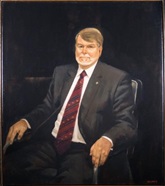
Mr Harry Jenkins, Speaker of the House of Representatives, 2010 by Rick Amor (1948)
Image courtesy of Historic Memorials Collection, Parliament House Art Collection, Canberra ACT
|
|
2008
|
Nursing mothers proxy vote |
|
| |
On 12 February 2008, the House of Representatives passes a resolution allowing members who are nursing mothers to vote by proxy 'for any division except that on the third reading of a bill which proposes an alteration of the Constitution'.
In doing so the House recognises that Members required to nurse infants may not always be able to attend in the Chamber to vote in divisions. The provision is first used on 20 October 2008 by Sophie Mirabella (LP, Member for Indi, Vic., 2001‒). [4]
|
|
|
2008
|
Apology to Stolen Generations
|
|
| |
On 13 February 2008 the Prime Minister the Hon. Kevin Rudd (ALP, Member for Griffith, Qld, 1998‒) presents an apology to Indigenous Australians as a motion to be voted on by the House of Representatives. The motion offers an apology to Australia's Indigenous peoples, and especially to members of the 'Stolen Generations'.
The Prime Minister follows the apology with a 20-minute speech which is witnessed in the gallery of the House by invited members of the Stolen Generation, and televised to large gatherings of people in venues around Australia including a large crowd outside Parliament House:
We apologise for the laws and policies of successive parliaments and governments that have inflicted profound grief, suffering and loss on these our fellow Australians. We apologise especially for the removal of Aboriginal and Torres Strait Islander children from their families, their communities and their country... [5]
The Hon. Dr Brendan Nelson (LP, Member for Bradfield, NSW, 1996‒2009), Leader of the Opposition, speaks in support of this motion. An identical motion is heard by the Senate and is passed unanimously. Following the Apology Lorraine Peeters, a member of the Stolen Generations, presents the Prime Minister and the Leader of the Opposition with a glass coolamon made by Bai Bai Napangardi, a Balgo artist. The coolamon contains the message: 'On behalf of our people, thank you for saying sorry'. Tom Calma, the Aboriginal and Torres Strait Islander Social Justice Commissioner, gives a speech in the Members' Hall after being asked by the Stolen Generations Alliance and the National Sorry Day Committee to respond to the Apology. [6]
|
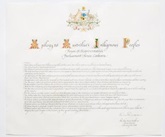
The Apology Manuscript, 2008 by Gemma Black (1956-)
Image courtesy of Parliament House Gift Collection, Canberra ACT
Watch: Apology to Stolen Generations
Video courtesy of DPS Broadcasting, Parliament House
|
|
2008
|
World Youth Day invitation
|
|
| |
The Archbishop of Sydney, Cardinal George Pell and the Archbishop of Canberra and Bishop Anthony Fisher join Catholic schoolchildren from across Canberra and the wider region in welcoming a 3.8 metre cross and an icon into the Great Hall of Parliament House on World Youth Day celebrated on 18 February 2008.
The objects come from Ground Zero in New York City, East Timor, and a genocide memorial in Rwanda. They are gifts from Pope John Paul II to the young people of the world, and, accompanied by an indigenous Australian message stick, represent an invitation to young people from Pope Benedict XVI, to attend World Youth Day in Sydney in July 2008. [7]
|
|
|
2008
|
2020 Summit
|
|
| |
Parliament House is the venue for a two-day Australia 2020 Summit on 19 and 20 April 2008.
Organised by the Rudd Government, the Summit is designed to develop long-term options for the nation across 10 critical areas. It involves 1000 Australians who are leaders in their fields. [8]
|
|
|
2008
|
20th anniversary
|
|
| |
A ceremony to celebrate the 20th anniversary of the opening of Parliament House is held on 9 May 2008.
The ceremony is themed to 'commemorate the contribution of those who were involved in the design and construction of the building'. About 1000 workers take part in a special ceremony in the Great Hall. [9]
|
Watch : New Parliament House turns 20
Video courtesy of Pride of Place , House of Representatives, Parliament House
|
|
2008
|
Bark petition presented
|
|
| |
In July 2008, following the apology to the stolen generations by the Prime Minister the Hon. Kevin Rudd (ALP, Member for Griffith, Qld, 1998‒), Galarrwuy Yunupingu presents the Prime Minister with a bark petition requesting ‘full recognition of Indigenous rights in the Australian Constitution’. Yunupingu later writes:
The invitation will be to join with him [Kevin Rudd] to hang the 2008 Yirrkala Petition on the wall of Parliament House, side by side with the 1988 Barunga Statement and the 1963 Bark Petition. [10]
|
Read: Yirrkala Petition presented to Prime Minister Kevin Rudd in 2008
|
|
2008
|
Youngest woman parliamentarian
|
|
| |
Senator Sarah Hanson-Young (Greens, Senator for South Australia, 2007‒) takes her place in the Senate at the age of 25 on 1 July 2008 and gives her First Speech on 1 September 2008. She is the youngest woman to enter the Commonwealth Parliament.
Former Senator Natasha Stott Despoja was previously the youngest woman, following her commencement in the Senate in 1995 at the age of 26.
|

Senator Sarah Hanson-Young
Image courtesy of Parliamentary Handbook
|
|
2008
|
Change of President
|
|
| |
On 26 August 2008 Senator the Hon. John Hogg (ALP, Senator for Queensland, 1996‒) is elected as President of the Senate, succeeding the Hon. Alan Ferguson.
|
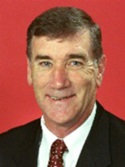
Senator the Hon. John Hogg
Image courtesy of Parliamentary Handbook
|
|
2008
|
First woman Governor-General
|
|
| |
On 5 September 2008 at Parliament House, Ms Quentin Bryce AC is sworn-in as the twenty-fifth Governor-General of the Commonwealth of Australia by swearing the Oath of Allegiance to Her Majesty the Queen, Her Heirs and successors according to law. She is the first woman to hold that position.
|
Watch : Swearing in of Governor-General, Quentin Bryce AC
Video courtesy of DPS Broadcasting, Parliament House
|
|
2008
|
Protesters removed from House of Representatives
|
|
| |
Several protesters are removed from the House of Representatives on 1 December 2008. An Azerbaijani man jumps from the public gallery onto the floor of the chamber, while another visitor calls out 'There is no humanity here!'
The man who jumped later said he wanted to draw attention to the plight of his family, who had been in Australia for 11 years without being able to secure permanent residence status. They were unable to be deported to their country of origin, which no longer existed. [11] This is one of several incidents in this period. In late September a climate change protester is removed from the public gallery of the Senate after jumping into a prohibited area and, in late October, security guards wrestle a man who threatens to jump from the public gallery in the House of Representatives.
|
|
| 2008 |
‘Cash for photograph’ scandal |
|
| |
James Bidgood (ALP, Member for Dawson, Qld, 2007‒10) allegedly attempts to sell photographs taken of a protester who threatens to set himself alight outside Parliament House. The protester had earlier disrupted Question Time by jumping onto the floor of the House of Representatives from the public gallery. The Speaker of the House of Representatives refers the incident to the Committee of Privileges and Members' Interests, which is proposing to review the question of introducing a code of conduct for members. The Speaker of the House of Representatives refers the incident to the Committee of Privileges and Members' Interests ‘as an example of an incident of concern’, noting that the Committee has proposed to review the question of introducing a code of conduct for members.[12] |
|
|
2009
|
Economic stimulus package
|
|
| |
The Rudd Government's $42 million economic stimulus package is passed by the Senate at the second attempt on 13 February 2009 as a key component of the Government's response to the global financial crisis.
The package is passed with the support of the five Greens Senators, Family First Senator Steve Fielding (Senator for Victoria, 2005‒11), and Independent Senator Nick Xenophon (Senator for South Australia, 2008‒) whose support is finally secured in a deal to bring forward money earmarked for future years for the Murray‒Darling Basin and other water projects. [13]
|
|
|
2009
|
Senate committee changes reversed
|
|
| |
On 13 May 2009 the changes to the Senate standing committee structure agreed to in 2006 are reversed, restoring the post-1994 structure involving pairs of committees in each subject area. [14]
|
|
|
2009
|
Childcare centre opens
|
|
| |
After nearly three decades of surveys, reviews, committee reports and cross-party calls for the implementation of family-friendly facilities, an on-site childcare centre opens in Parliament House for the care of children of members, senators, their staff and staff of the parliamentary departments. The centre is built in the former non-members' bar at a cost of about $380 000.
In seeking approval for the facility, Leader of the House the Hon. Anthony Albanese (ALP, Member for Grayndler, NSW, 1996‒) states:
The fact we have many facilities in this parliament-a snooker room, a pool, a gym, a dining room and many other facilities here that are appropriate in this magnificent building-but no childcare centre reflects the parliament of the last century. It is appropriate that the parliament of this century reflect more adequately values such as ensuring that all parents, whether they be men or women, have access to child care. [15]
|
|
| 2009 |
Memorial Service for Craig Senger |
|
| |
On 31 July 2009 a memorial service is held in the Great Hall for Craig Senger, the first Australian diplomat to be killed in a terrorist attack. He was one of three Australians who died as a result of terrorist bombings at the JW Marriott and the Ritz-Carlton hotels in Jakarta on 17 July.
|
|
|
2009
|
Apology to Forgotten Australians
|
|
| |
In a moving ceremony held in the Great Hall at Parliament House on 16 November 2009, the Prime Minister the Hon. Kevin Rudd (ALP, Member for Griffith, Qld, 1998‒) and Leader of the Opposition the Hon. Malcolm Turnbull (LP, Member for Wentworth, NSW, 2004‒) apologise on behalf of the nation to more than 500 000 'Forgotten Australians' and former child migrants, many of whom suffered abuse and neglect while in out-of-home care during the last century. In part the Prime Minister says:
And we come together today to offer our nation's apology. To say to you, the Forgotten Australians, and those who were sent to our shores as children without your consent, that we are sorry. Sorry - that as children you were taken from your families and placed in institutions where so often you were abused. Sorry - for the physical suffering, the emotional starvation and the cold absence of love, of tenderness, of care. Sorry - for the tragedy, the absolute tragedy, of childhoods lost - childhoods spent instead in austere and authoritarian places, where names were replaced by numbers, spontaneous play by regimented routine, the joy of learning by the repetitive drudgery of menial work. Sorry - for all these injustices to you, as children, who were placed in our care.
The text of the apology is tabled in the House of Representatives and in the Senate, and is accompanied by a number of moving constituency statements. The Parliamentary Library publishes a Background Note providing a brief overview and history of child migrants and children in institutional care in Australia. [16]
|
Watch: Apology to Forgotten Australians
Video courtesy of DPS Broadcasting, Parliament House
|
2009 |
Retirement of the Clerk of the House of Representatives
|
|
| |
Mr Ian Harris AO, Clerk of the House of Representatives since July 1997, retires on 4 December 2009. The new Clerk is Mr Bernard Wright, who commences in the role on 5 December 2009. |
|
2009 |
Retirement of the Clerk of the Senate
|
|
| |
Mr Harry Evans, Clerk of the Senate since 1988, retires in December 2009. Mr Evans is the longest serving Clerk of the Australian Senate. The new Clerk of the Senate is Dr Rosemary Laing, who commences in the role on 5 December 2009. |
|
|
2010
|
Address by Indonesian Prime Minister
|
|
| |
On 10 March 2010 His Excellency, Dr Susilo Bambang Yudhoyono , President of the Republic of Indonesia, addresses the Parliament. In accordance with a procedure agreed to in 2003, the address is presented in the House and Senators attend as guests of the House. [17]
|
Watch: Address by the President of the Republic of Indonesia
Video courtesy of DPS Broadcasting, Parliament House
|
|
2010
|
Welcome to country introduced
|
|
| |
On 23 June 2010, both Houses amend their standing orders to make an Indigenous Welcome to Country Ceremony a permanent feature of the opening of Parliament.[18]
|
|
|
2010
|
First woman Prime Minister
|
|
| |
On 24 June 2010 the Hon. Julia Gillard (ALP, Member for Lalor, Vic., 1998‒) becomes the 27th Prime Minister of Australia, and the first woman to hold that position having previously served as Australia's first female Deputy Prime Minister. [19]As a Welsh-born migrant, she is also the first Australian Prime Minister to be born overseas since the Rt Hon. WM (Billy) Hughes.
|
Watch : The Hon. Julia Gillard sworn in as Australia's 27th Prime Minister
Source: Ten News
|
|
2010
|
Opening of 43rd Parliament
|
|
| |
Australia’s first female Governor-General, Ms Quentin Bryce AC, opens the 43rd Parliament on 28 September 2010, following the Commonwealth election held on 21 August 2010. [20]
In the closest election result since 1961, and the first hung Commonwealth Parliament since 1941, no one party wins the majority of seats in the House of Representatives election held on 21 August 2010. After the election, the Australian Labor Party negotiates agreement with three Independents and the Australian Greens giving it the necessary support to form a minority Government. [21] The hung parliament, and the resulting Agreement for a better Parliament: Parliamentary Reform, have a major impact on the work and practices of the 43rd Parliament including the introduction of time limits on questions and answers, extra sitting hours, and greatly increased opportunities for private Members including a significant increase in the number of private members’ bills —more than in any year since Federation in 1901. [22]
|
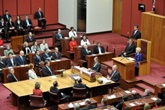
The Governor-General delivers her opening of Parliament address
Image courtesy of AUSPIC
Watch: Opening of the 43rd Parliament of Australia, 28 September 2010, Part 1 and Part 2
Video courtesy of DPS Broadcasting, Parliament House
|
|
2010
|
Changes to procedures in House of Representatives
|
|
| |
On 29 September 2010, as a result of the federal election held on 21 August 2010 and the Agreement for a better Parliament: Parliamentary Reform, the House of Representatives agrees to a large number of amendments to standing orders.
An important aspect of the Agreement is the requirement for monitoring and reporting of the procedural changes implemented in the House of Representatives in the 43rd Parliament, and the first report is presented by the House Standing Committee on Procedure on 13 May 2011. [23]
|
|
|
2010
|
Lines that Speak exhibition
|
|
| |
To commemorate Romaldo Giurgola's 90th birthday on 2 September 2010, Parliament House launches an exhibition calledLines that speak: architectural drawings of Romaldo Giurgola (3 September‒31 October 2010). [24]
The exhibition is curated by is former Mitchell/Giurgola and Thorp colleague Pamille Berg, and presents Giurgola's mostly pencil renderings of elevations, plans and perspectives including Parliament House.
|
|
|
2010
|
Indigenous custodians acknowledged
|
|
| |
Amongst the significant procedural changes agreed to by the House of Representatives on 29 September 2010 is the introduction of an acknowledgement of Indigenous custodians of country, to be read by the Speaker at the start of each sitting day before the usual prayers.[25] The Senate agrees to incorporate an acknowledgement of country after prayers when it amends standing order 50 on 26 October 2010. [26]
The wording for both Houses is:
I acknowledge the Ngunnawal and Ngambri peoples who are the traditional custodians of the Canberra area and pay respect to the elders, past and present, of all Australia's Indigenous peoples. [27]
|
|
|
2010
|
First Indigenous Member
|
|
| |
The first Indigenous member of the House of Representatives Ken Wyatt (LP, Member for Hasluck, WA 2010‒), gives his First Speech to the House on 29 September 2010, following his election at the Commonwealth elections held on 21 August 2010. [28]
He represents the electoral division of Hasluck in Western Australia for the Liberal Party of Australia. He is a Noongar, Yamatji and Wangai man of Indian, English and Irish descent. The contest for the seat of Hasluck is unusual in that three of the seven candidates are Indigenous Australians. His speech is witnessed by Aboriginal elders who watch from the gallery as he describes his personal journey to becoming a member of parliament. He wears a kangaroo skin cloak called a bookha, the traditional cloak of the Nyungar people of Western Australia presented to him by tribal Elders. He also wears it at the opening of the 43rd Parliament on the previous day.
|
Watch : Ken Wyatt MP give his First Speech to the House
Video courtesy of DPS Broadcasting, Parliament House
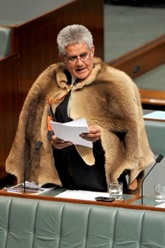
The first Indigenous member of the House of Representatives, Ken Wyatt, delivers his First Speech to the House of Representatives.
Image courtesy of AAP
|
|
2010
|
Youngest Member
|
|
| |
At 20 years old Wyatt Roy (LP, Member for Longman, Qld, 2010‒) is the youngest person to be elected to the House of Representatives. He gives his First Speech to Parliament on 26 October 2010. [29]
|
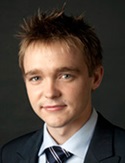
Wyatt Roy MP
Image courtesy of Parliamentary Handbook
Watch: Wyatt Roy's First Speech to Parliament
Video courtesy of DPS Broadcasting, Parliament House
|
|
2010
|
Senate committee system celebrated
|
|
| |
A conference to mark the 40th anniversary of the Senate committee system is held in November 2010. The proceedings are published in the Senate's journal, Papers on Parliament, as were the proceedings of the 20th anniversary conference in 1990. [30]
|
|
|
2010
|
High-security briefing room
|
|
| |
A high-security emergency response briefing room is built next to the Cabinet Room in Parliament House.
It is designed to be a central coordination point during times of national and international crisis, and is installed following a border security review conducted in 2008. [31]
|
|
|
2010
|
Policies governing protests and assemblies
|
|
| |
The Secretary of the Department of Parliamentary Services issues the Parliament of Australia's Operating Policies and Procedures No 16 governing the conduct of protests and other assemblies in the Parliamentary precincts.
|
|
|
2011
|
Address by Mongolian Prime Minister Sukhbaatar Batbold
|
|
| |
On 23 February 2011 the Prime Minister of Mongolia, Sukhbaatar Batbold, is welcomed to Parliament House by the Prime Minister the Hon. Julia Gillard (ALP, Member for Lalor, Vic., 1998‒) as part of his official visit to Australia.
He is the first Mongolian head of government to visit Australia since the two countries established diplomatic relations in 1972. The leaders witness the signature of four bilateral arrangements relating to vocational educational cooperation, agricultural development, fostering public access to information, and collaborative opportunities in scientific fields of common interest. [32]
|
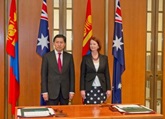
Visit by His Excellency Mr Sukhbaatar Batbold MP, Prime Minister of Mongolia
Image courtesy of AUSPIC
|
|
2011
|
Parliament House lights up
|
|
| |
Parliament House is illuminated during 'Enlighten' Canberra in March 2011, a new feature of the ACT Government's Canberra Festival. 'Enlighten' includes illuminated projections on several buildings in order to showcase Canberra's most famous tourist attractions.
|

Parliament House during the Enlighten festival, 2011
Image courtesy of Howard Moffat/AUSPIC
|
| 2011 |
Removal of Executive veto over Australian Capital Territory and Northern Territory |
|
| |
Parliament passes a bill which removes the right of a federal minister or the Cabinet to veto or change territory laws. It is the first bill introduced by the Greens passed by the federal Parliament. The veto power was used in 2006 to disallow the ACT's civil union laws. The Territories Self-Government Legislation Amendment (Disallowance and Amendment of Laws) Act 2011 provides that territory laws can only be disallowed or changed through a vote of federal Parliament. Section 122 of The Australian Constitution gives federal Parliament the plenary power to 'make laws for the government of any territory'. This provision does not apply to the states
|
|
|
2011
|
Malaysian Prime Minister Najib Razak
|
|
| |
On 3 March 2011 the Prime Minister of Malaysia Najib Razak visits Parliament House, the third visit by a Malaysian Prime Minister in 30 years.[33]
|
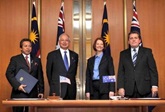
Visit by the Right Honourable Dato Sri Mohd Najib bin Tun Haji Abdul Razak, Prime Minister of Malaysia
Image courtesy of AUSPIC
|
| 2011 |
Confidence in the Speaker
|
|
| |
On 31 May 2011, the Speaker of the House, Mr Harry Jenkins, names a member for continuing to interject after having been warned by the Chair. The subsequent motion that the member be suspended from the House is defeated.
In declaring the result of the division, the Speaker states his intention to consider his position.[34] House of Representatives Practice notes that the naming of a Member is, ‘in effect, an appeal to the House to support the Chair in maintaining order’. The Leader of the Opposition immediately moves a motion of confidence in the Speakership, which is seconded by the Prime Minister who also speaks on the motion (as does the member for Lyne). The motion is agreed to on the voices.
|
|
|
2011
|
Visit by Dalai Lama
|
|
| |
The fourteenth Dalai Lama, Tenzin Gyatso, visits Parliament House on 14 June 2011 as a guest of the All Parliamentary Group for Tibet. It is his fourth visit to Parliament in five years, and his eighth visit to Australia. [35]
|
|
|
2011
|
Address by New Zealand Prime Minister
|
|
| |
On 20 June 2011 the Prime Minister of New Zealand, the Rt Hon. John Key , becomes the first New Zealand head of state to address the Parliament. In accordance with a procedure agreed to in 2003, the address is presented in the House and Senators attend as guests of the House. [36]
|
Watch: Address by the Prime Minister of New Zealand
Video courtesy of DPS Broadcasting, Parliament House
|
|
2011
|
Solar panels fitted
|
|
| |
In June 2011 a section of the roof of Parliament House is fitted with solar panels as part of a pilot project to assess how alternative technologies can be integrated into the building systems.
There are 42 panels or 7.8 kW on the roof of the Gardeners' Compound and 192 panels or 35.5 kW on the roof of the Senate wing. The project forms part of the environmental management activities at Parliament House which aim to reduce energy use, greenhouse gas emissions, water use and waste generation. [37]
|
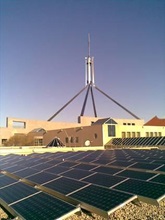
Solar panels on Parliament House roof
Image courtesy of Parliament of Australia
|
|
2011
|
Indigenous banner tabled in the Senate
|
|
| |
During a Senate debate on the National Radioactive Waste Management Bill 2010 on 14 June 2011, Senator Scott Ludlam (Greens, Senator for WA, 2008) is given leave to table a banner covered in handprints and containing exhortations in three different Indigenous languages saying 'No waste dump at Muckaty'.
Senator Ludlam stated that:
They asked me in Tennant Creek a month or so ago to bring a document into the chamber for tabling, and I checked with the clerks to make sure that it qualified as a document under standing orders.
He was given leave to have the document incorporated in Hansard, and an image is scanned and printed accordingly. The handprints represent all the family groups involved in the Muckaty Land Trust. [38]
|
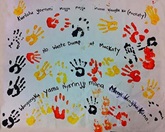
Banner tabled in the Senate and incorporated into the Hansard, 14 June 2011
Image courtesy of Hansard Services Unit
|
|
2011
|
White powder security alert
|
|
| |
Parliament House is locked down and 16 people isolated following the discovery of suspicious white powder in an envelope in an office within the ministerial wing on 10 August 2011. The incident is identified as a hoax. [39]
|
|
|
2011
|
'Convoy of no confidence'
|
|
| |
A 'Convoy of No Confidence' rally, involving 11 truck convoys from around Australia, gathers outside Parliament House on 22 August 2011.
The rally is principally organised as a protest against the Gillard Government's proposal to introduce a carbon tax, although other grievances over Government policies are aired. The rally is addressed by several speakers including the Leader of the Opposition, the Hon. Tony Abbott (LP, Member for Warringah, NSW, 1994‒). [40]
|
|
|
2011
|
Tax summit
|
|
| |
The Gillard Government holds a two-day tax forum for 200 participants at Parliament House on 4 and 5 October 2011.
|
|
|
2011
|
Carbon tax legislation
|
|
| |
On 12 October 2011, the Gillard Government secures passage of its controversial carbon tax legislation through the House of Representatives with the support of key crossbench members. The Clean Energy Bill 2011 and 17 related bills pass the Senate on 8 November after an agreement between the ALP and the Australian Greens to truncate debate on the bills and bring the final vote forward.
|
|
|
2011
|
Royal visit
|
|
| |
During her 16th visit to Australia, Her Majesty The Queen, together with His Royal Highness The Duke of Edinburgh, attends a reception held in the Great Hall at Parliament House on 21 October 2011.
Her Majesty is officially welcomed by the Prime Minister the Hon. Julia Gillard (ALP, Member for Lalor, Vic., 1998‒), and gives a speech to invited guests.
|
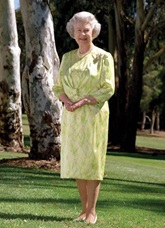
Her Majesty Queen Elizabeth II
Image courtesy of Parliamentary Handbook
Watch: Royal visit by Her Majesty The Queen and HRH The Duke of Edinburgh
Video courtesy of DPS Broadcasting, Parliament House
|
|
2011
|
Address by US President
|
|
| |
The President of the United States, the Hon. Barack Obama , addresses the Parliament on 17 November 2011, focusing on the relationship between Australia and the United States. [41] In accordance with a procedure agreed to in 2003, the address is presented in the House and Senators attend as guests of the House. [42]
President Obama is the ninth foreign Head of State or dignitary to address the Australian Parliament since the move to the permanent building in 1988, and he is the fourth US President to do so. Prior to 1988, foreign dignitaries had addressed the Australian Parliament on only one occasion-a delegation from the House of Commons addressed the Parliament at the provisional Parliament House on 29 November 1951 and presented the Mace to commemorate the Australian Parliament's jubilee. [43] The event requires many weeks of preparation by staff of the Parliament's three departments.
|
Watch : Address by the President of the United States of America, the Hon. Barack Obama
Video courtesy of DPS Broadcasting, Parliament House
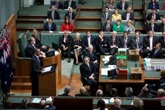
US President Barack Obama addresses a joint session of the Australian Parliament in the House of Representatives at Parliament House, Canberra on November 17, 2011
Image courtesy of Creative Commons, Author: Pete Souza
|
|
2011
|
Speaker resigns
|
|
| |
Harry Jenkins (ALP, Member for Scullin, Vic., 1986‒) unexpectedly resigns as Speaker on 24 November 2011, and leaves the Chair after inviting the Deputy Speaker, Mr Slipper, to take the Chair.
Later in the day, an election is held for a new Speaker. The Hon. Peter Slipper (Member for Fisher, Qld, 1984‒87 and 1993‒; NP, 1984‒87; LP, 1993‒2011; and Independent, 2011‒) is nominated, the nomination is seconded, and Mr Slipper accepts the nomination. Mr Slipper is elected unopposed. Ms Anna Burke MP is elected Deputy Speaker. Mr Slipper resigns from the LNP upon accepting the position as Speaker, and remains in the House of Representatives as an Independent Member. [44]
|

The Hon. Peter Slipper MP
Image courtesy of Parliamentary Handbook
|
| 2011 |
New Human Rights Act |
|
| |
The Human Rights (Parliamentary Scrutiny) Act 2011 passes the Parliament on 25 November 2011. The Act requires Ministers introducing legislation to table a statement outlining how the Bill complies with the seven main United Nations human rights treaties to which Australia is a party, namely the:
The Act also establishes a Parliamentary Joint Committee on Human Rights to examine Bills and existing Acts for their compatibility with human rights, and to inquire into any matter relating to human rights which is referred to it by the Attorney-General.
The Act fulfils certain commitments in the government’s Human Rights Framework which was announced in 2010 in response to the report of the National Human Rights Consultation Committee. |
|
|
2012
|
Aboriginal protest
|
|
| |
On 27 January 2012, protesters from the Aboriginal tent embassy burn the Australian flag on the front steps of Parliament House, amid tensions over the future of the embassy.
|
|
|
2012
|
Seven Historical Documents of Truth and Justice
|
|
| |
In February 2012, the National Sorry Day Committee presents Seven Historical Documents of Truth and Justice to the Australian Parliament in a special ceremony marking the fourth anniversary of the National Apology to the Stolen Generations. The documents include:
- Petition to King George VI & The Day of Mourning Resolution 1938
- Barunga Statement 1988
- Report of the Royal Commission into Aboriginal Deaths in Custody 1991
- Bringing them home Report 1997
- Australian Declaration Towards Reconciliation and Roadmaps 2000
- United Nations Declaration on the Rights of Indigenous Peoples 2007, and
- Australian Parliament's Apology to the Stolen Generations 2008.
The documents are presented in a traditional message stick carved by Wiradjuri artist Duncan Smith. The Parliamentary Library is the custodian of this gift, which is on display in the Ground Floor Reading Room.
|
|
|
2012
|
Speaker's procession introduced
|
|
| |
The Speaker, the Hon. Peter Slipper (Member for Fisher, Qld, 1984‒87 and 1993‒; NP, 1984‒87; LP, 1993‒2011; and Independent, 2011‒), reintroduces a formal Speaker's procession to the Parliament on 14 February 2012, by walking through the Members' Hall before entering the Chamber.
The Speaker's procession was a tradition in the provisional (Old) Parliament House before the Parliament moved to its permanent home in 1988.
|
Watch: Speaker’s procession, 14 February 2012
Video courtesy of DPS Broadcasting, Parliament House
|
|
2012
|
Federation Chamber
|
|
| |
The Main Committee of the House of Representatives is renamed the Federation Chamber on 27 February 2012.
The House of Representatives Committee on Procedure originally recommends a name change in 2004 in order to avoid confusion with the main committee room in Parliament House. The government of the day notes the recommendations but does not support a name change. The matter is raised again in 2012 and a motion by the Hon. Anthony Albanese (ALP, Member for Grayndler, NSW, 1996‒) to amend the House Standing Orders is passed after debate. The decision to change the name is announced by the Speaker, the Hon. Peter Slipper (Member for Fisher, Qld, 1984‒87 and 1993‒; NP, 1984‒87; LP, 1993‒2011; and Independent, 2011‒), on 7 February 2012. The chamber's new name is chosen in accordance with the 2004 recommendation that it should reflect 'a significant aspect of Australian culture or parliamentary democracy'. [45] In 2011‒12, the Federation Chamber meets for more hours than in any previous year. [46]
|
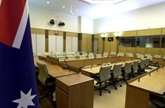
Main Committee chamber, renamed Federation Chamber
Image courtesy of Parliament of Australia
|
| 2012 |
Visit by President of Lebanon
|
|
| |
On 16 April 2012 the President of Lebanon, His Excellency Michel Suleiman attended a luncheon at Parliament House during his State Visit to Australia. |
Watch: Visit by President of Lebanon
Video courtesy of DPS Broadcasting, Parliament House |
|
2012
|
Speaker steps aside
|
|
| |
On 22 April 2012 the Hon. Peter Slipper (Member for Fisher, Qld, 1984‒87 and 1993‒; NP, 1984‒87; LP, 1993‒2011; and Independent, 2011‒) releases a statement indicating that he will stand aside as Speaker whilst investigations are underway into allegations of sexual harassment and allegations of fraudulent abuse of Cabcharge vouchers, and that the Deputy Speaker, Anna Burke (ALP, Member for Chisholm, Vic., 1998‒), will act as Speaker. [47]
On 29 April 2012 Mr Slipper issues a Statement by the Speaker saying that there is no longer any reason for him to step aside. On 8 May 2012 Mr Slipper makes a formal statement to the House in which he invites the Deputy Speaker to 'take the chair'.
|
|
| 2012 |
Visit by Prime Minister of Thailand
|
|
| |
On 28 May 2012 the Prime Minister of the Kingdom of Thailand, Her Excellency Ms Yingluck Shinawatra, attended a luncheon at Parliament House during her State Visit to Australia. |
Watch: Visit by the Prime Minister of Thailand
Video courtesy of DPS Broadcasting, Parliament House |
| 2012 |
Mabo Native Title decision remembered
|
|
| |
On 31 May 2012, the House of Representatives marks the twentieth anniversary of the High Court’s Mabo native title decision. |
|
|
2012
|
Design principles clarified
|
|
| |
In his submission to an inquiry by the Senate Standing Committee on Finance and Public Administration into the Department of Parliamentary Services, the architect Romaldo Giurgola clarifies the design principles that define the character and meaning of the building:
..first, the significance of the building as a democratic forum for the nation of Australia; second, making the process of government visible and accessible to the public; third, the building design as a symbolic sequence of spaces with reference to Australia's historical and cultural evolution over time; and, finally, the design of Parliament House as a workplace which was intended to enhance the health and wellbeing of all occupants, which I think is important because it becomes a model for everyone to look to. [48]
|
|
| 2012 |
Visit by Prime Minister of Zimbabwe
|
|
| |
On 23 July 2012 the Prime Minister of the Republic of Zimbabwe, the Hon. Morgan Txvangirai, attended a luncheon at Parliament House during his State Visit to Australia. |
Watch: Visit by Prime Minister of Zimbabwe
Video courtesy of DPS Broadcasting, Parliament House |
|
2012
|
Parliamentary Budget Office established
|
|
| |
The inaugural Parliamentary Budget Officer Mr Phil Bowen takes up his appointment on 23 July 2012 as head of the fourth Parliamentary Department-the Parliamentary Budget Office. The role of the new department is to inform the Parliament by providing independent and non-partisan analysis of the budget, fiscal policy and the financial implications of proposals.
The new department is established under the Parliamentary Service Act 1999 and fulfils a requirement of the Agreement for a better Parliament: Parliamentary Reform negotiated between the Coalition, the ALP and the independents following the 2010 Commonwealth election. [49]
|
|
|
2012
|
New website
|
|
| |
The Parliament of Australia launches a new website following a redevelopment project conducted by the parliamentary departments.
|
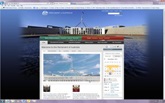
New Parliament of Australia website
Image courtesy of Parliament of Australia
|
|
2012
|
Heritage Advisory Board
|
|
| |
A Heritage Advisory Board is established to provide heritage advice to the Presiding Officers and to provide oversight of detailed heritage issues for Parliament House. The Board meets for the first time in May 2012.
|
|
| 2012 |
Acknowledgement of Peter Norman, Athlete |
|
| |
In August and October 2012, the Senate and House of Representatives acknowledge Peter Norman, silver medalist in the 200 metres at the 1968 Mexico Games. Norman stood in solidarity, wearing an Olympic Project for Human Rights badge, during the medal ceremony as African-American athletes Tommie Smith and John Carlos gave the `black power' salute. Many believe Norman was overlooked for the 1972 Olympic Games because of his actions in Mexico. Norman died in 2006. Both chambers pass a motion acknowledging Norman's action in the cause of racial equality and apologizing for the treatment he received upon his return to Australia.
|
|
| 2012 |
Opposition Leader suspended from the House |
|
| |
On 20 August 2012 Leader of the Opposition, Tony Abbott, is suspended from the Chamber for using un-parliamentary language during Question Time. (He is ejected under Standing Order 94(a) which allows the Speaker to suspend a member from the chamber for one hour without needing a vote of the House.) Mr Abbott becomes the fourth Leader of the Opposition to be ordered from the chamber. The others are: John Howard in 1986, Robert Menzies 1949 and Joseph Cook MP in 1914. No Prime Minister has been suspended from the chamber.
|
|
| 2012 |
Visit by Prime Minister of Solomon Islands
|
|
| |
On 22 August 2012 the Prime Minister of the Solomon Islands, Gordon Darcy Lilo, attends a luncheon at Parliament House during his State Visit to Australia. |
Watch: Visit by the Prime Minister of the Solomon Islands
Video courtesy of DPS Broadcasting, Parliament House |
|
2012
|
Change of Speaker
|
|
| |
The Speaker, the Hon. Peter Slipper (Member for Fisher, Qld, 1984‒87 and 1993‒; NP, 1984‒87; LP, 1993‒2011; and Independent, 2011‒), resigns on 9 October 2012 under unusual circumstances, including an unsuccessful motion by the Leader of the Opposition to remove the Speaker citing section 35 of the Constitution.
This follows his formal statement to the House on 8 May 2012 in which he invites the Deputy Speaker to 'take the chair' following allegations of sexual harassment and allegations of fraudulent abuse of Cabcharge vouchers. Anna Burke (ALP, Member for Chisholm, Vic., (1998‒) is elected unopposed on 9 October 2012. She becomes the second female speaker of the House of Representatives and the third female Presiding Officer in the history of the Australian Parliament. [50]
|

Anna Burke MP
Image courtesy of Parliamentary Handbook
|
| 2012 |
Visit by Prime Minister of Singapore
|
|
| |
The Prime Minister of the Republic of Singapore, His Excellency Lee Hsien Loong, attended a luncheon at Parliament House during his State Visit to Australia on 11 October 2012. |
Watch: Visit by Prime Minister of Singapore
Video courtesy of DPS Broadcasting, Parliament House |
| 2012 |
Bali Bombings national commemoration |
|
| |
The Governor-General, Her Excellency Ms Quentin Bryce AC CVO, leads a National Commemoration on 12 October 2012 marking the 10th anniversary of the Bali Bombings in the Great Hall of Parliament House:
…We gather as one. People from across Australia join in solidarity and support, in love and friendship – to remember. |
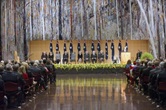
National Memorial Service to mark the 10th Anniversary of the 2002 Bali Bombings
Image courtesy of AUSPIC
Watch: National commemoration service marking 10th anniversary of Bali Bombings
Video courtesy of DPS Broadcasting, Parliament House
|
| 2012 |
Extension of term for Governor-General |
|
| |
On 24 October 2012, the term of the Governor-General, Her Excellency Ms Quentin Bryce AC CVO, is extended for six months until March 2014. The decision is welcomed by the Leader of the Opposition, the Hon Tony Abbott MP. |
|
| 2012 |
Apology to victims of sexual abuse in the Australian Defence Force
|
|
| |
On 26 November 2012 the Minister for Defence, the Hon Stephen Smith (ALP, Member for Perth, WA, 1993‒), makes a ministerial statement in the House, apologising on behalf of the Government to members of the Australian Defence Force who suffered sexual or other forms of abuse in the course of their service. The apology follows a report by law firm DLA Piper which detailed several hundred allegations of abuse within the Australian Defence Force. The Shadow Minister for Defence, Science, Technology and Personnel, Stuart Robert (LP, Member for Fadden, Qld, 2007‒), offers the coalition’s ‘strongest and unqualified support’.
|
Watch: Apology to victims of sexual abuse in the Australian Defence Force, 26 November 2012
Video courtesy of DPS Broadcasting, Parliament House
|
|
2012
|
New rules for media
|
|
| |
On 28 November 2012 the Presiding Officers issue new rules for media-related activity in Parliament House and its precincts, commencing with the 2013 parliamentary sittings on 5 February 2013 and replacing the previous rules and guidelines on filming and photography issued in December 2008.
The rules specify locations in public and private areas where media-related activity is prohibited, permitted, or permitted subject to approval, and set out conditions for approvals where required. They prohibit the digital manipulation of broadcast material or still photographs of parliamentary proceedings, and the previous restriction in the previous rules on filming, and remove the previous rule regarding use of still photography of chamber proceedings, for satire or ridicule. [51] Some aspects of these rules are still to be implemented by changes to the broadcasting resolutions of each House.
|
|
| 2013 |
Indigenous constitutional recognition |
|
| |
On 13 February 2013, the fifth anniversary of the National Apology to the Stolen Generations, the House of Representatives passes the Aboriginal and Torres Strait Islander Peoples Recognition Bill 2012.
The Bill passes the Senate on 12 March 2013.
The Bill acknowledges that Aboriginal and Torres Strait Islander people are the first inhabitants of this nation, and that ‘they occupied this land from time immemorial’. It also ‘seeks to foster momentum for a referendum for constitutional recognition of Aboriginal and Torres Strait Islander peoples’, including a new legislative requirement for a review of public support for a referendum to be tabled in Parliament six months before any referendum bill is proposed.[52] The Bill follows earlier unsuccessful attempts to achieve constitutional change including the Howard Government’s proposed preamble in 1999, and the Coalition’s election promise in 2007 to hold a referendum to recognise Indigenous Australians in the Constitution. |
Read: Joint Select Committee on Constitutional Recognition of Aboriginal and Torres Strait Islander Peoples: Aboriginal and Torres Strait Islander Peoples Recognition Bill 2012, Commonwealth of Australia, January 2013 |
|
2013
|
First female Speaker dies
|
|
| |
The first female Speaker in the Australian Parliament, the Hon. Joan Child (ALP, Member for Henty, Vic., 1974‒5 and 1980‒90), dies on 23 February 2013 at the age of 91.
She served as Speaker from 11 February 1986 to 5 June 1987 and from 14 September 1987 to 28 August 1989. She was Speaker when the Parliament moved into the permanent Parliament House in 1988.
The House of Representatives pauses to remember former Speaker Child with a condolence motion moved by Prime Minister Gillard on 12 March 2013.
|
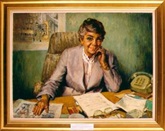
The Hon. Joan Child, 1988 by Charles William Bush (1911‒1989)
Image courtesy of Historic Memorials Collection, Parliament House Art Collection, Canberra ACT
Watch: Condolences for the Hon. Joan Child in the Senate, 26 February 2013
Watch: Condolences for the Hon. Joan Child in the House of Representatives, 13 March 2013
Video courtesy of DPS Broadcasting, Parliament House
|
| 2013 |
ACT Legislative Assembly able to determine its own numbers |
|
| |
In March 2013, Parliament passes the Australian Capital Territory (Self-Government) Amendment Bill 2013. The Bill gives the Australian Capital Territory Legislative Assembly the power to independently determine its own size (by enactment agreed to by a two-thirds majority of the Assembly).
This issue has been canvassed in a number of reviews since the Territory gained self-government. In January 2013, ACT Chief Minister, Katy Gallagher, established an Expert Reference Group to consult with the community on the appropriate size of the Assembly options for changing the Assembly’s size. The Group is to report by 31 March 2013. |
|
| 2013 |
Tweeting from the House
|
|
| |
Speaker of the House of Representatives, Anna Burke (ALP, Member for Chisholm, Vic., (1998‒), Ms Anna Burke, decides not to stop members tweeting in the chamber.
She makes the ruling after the Manager of Opposition Business in the House, the Hon Christopher Pyne (LIB, Member for Sturt, SA (1993--), asks that a government backbencher withdraw a comment made on twitter during Question Time. Announcing her decision, the Speaker tells the house that a twitter ban would mean
…a blanket restriction on all electronic and communication devices in the chamber. Although this may appeal to some members, I imagine it would be strongly resisted by others.[53]
|
|
| 2013 |
Re-enactment of the naming of Canberra
|
|
| |
On 12 March 2013 the Governor-General, Her Excellency Ms Quentin Bryce AC CVO, and the Prime Minister, the Hon Julia Gillard (ALP, Member for Lalor, Vic., 1998‒), take part in a re-enactment of the naming of Canberra. The event is part of celebrations to mark the capital's 100 year anniversary on 13 March, and is held on the lawns of Parliament House near the site of the original ceremony. |
Watch: Re-enactment of the naming of Canberra
Source: Fairfax Media
|
| 2013 |
The Centenary of the naming of Canberra
|
|
| |
The Senate passes a resolution on 13 March 2013 congratulating Canberra and its citizens on their centenary. The resolution recognises ‘Canberra, through its national institutions, as a showcase of the hopes and aspirations, milestones and achievements of the Australian nation’.
|
|
| 2013 |
National Apology for forced adoptions |
|
| |
On 21 March 2013, in a ceremony in the Great Hall at Parliament House, the Prime Minister the Hon Julia Gillard (ALP, Member for Lalor, Vic, 1998‒) and Leader of the Opposition the Hon. Tony Abbott (LP, Member for Warringah, NSW, 1994‒) apologise on behalf of the nation to those affected by forced adoption policies. Speaking at the event, the Prime Minister says in part:
No collection of words alone can undo all this damage. Or make whole the lives and families fractured by forced adoption. Or give back childhoods that were robbed of joy and laughter. Or make amends for the Birthdays and Christmases and Mother’s or Father’s Days that only brought a fresh wave of grief and loss. But by saying sorry we can correct the historical record.
After the event, motions of apology are moved in the House of Representatives and in the Senate. The Government also tables in the Senate the Government’s response to the Senate Community Affairs Reference Committee report Commonwealth Contribution to Former Forced Adoption Policies and Practices. The response includes funding for practical measures to assist those affected by forced adoption practices.
Between 2010-12 governments of all states and the Australian Capital Territory issued apologies to those affected by forced adoption.[54]
|
Watch: National Apology for forced adoptions
Video courtesy of DPS Broadcasting, Parliament House

National Apology for forced adoptions in the Great Hall
Image courtesy of DPS Broadcasting, Parliament House
|
| 2013 |
National Disability Insurance Scheme |
|
| |
The Parliament passes the National Disability Insurance Scheme Bill 2013, clearing the way for the scheme (to be known as Disability Care Australia) to be trialled from July 2013. Introducing the Bill to the House, the Prime Minister, the Hon Julia Gillard (ALP, Member for Lalor, Vic., 1998‒), says
Few actions in public life give me greater pleasure than introducing the National Disability Insurance Scheme Bill does today. The scheme to be established by this bill will transform the lives of people with disability, their families and carers. For the first time they will have their needs met in a way that truly supports them to live with choice and dignity. It will bring an end to the tragedy of services denied or delayed and instead offer people with disability the care and support they need over their lifetimes. This is a complex bill, yet at its heart is a very simple moral insight.[55]
The bill passes the House on 20 March 2013, and passes the Senate on 21 March 2013 with several amendments to which the House agrees. Although the scheme is extensive, it is unfunded. (The 2012-13 Budget includes $1 billion in funding for the NDIS trial.[56]) On 1 May 2013 the Prime Minister, the Hon Julia Gillard (ALP, Member for Lalor, Vic., 1998‒), announces a 0.5 per cent increase to the Medicare Levy to (from 1 July 2014) to part fund the scheme.
|
|
| 2013 |
APH turns 25 |
|
| |
On 9 May 2013 the 25th anniversary of the opening of the nation’s permanent Parliament House is marked by a morning tea held in the Great Hall to acknowledge and thank those who have worked at Parliament House.
The morning tea is attended by the Prime Minister the Hon. Julia Gillard (ALP, Member for Lalor, Vic., 1998‒), the Leader of the Opposition the Hon. Tony Abbott (LP, Member for Warringah, NSW, 1994‒), the President of the Senate Senator the Hon. John Hogg (ALP, Senator for Queensland, 1996‒), the Speaker of the House of Representatives Anna Burke (ALP, Member for Chisholm, Vic., 1998‒), and Senior Ngunnawal woman Aunty Jannette Phillips, together with about 700 current and former employees. The morning tea also provides an opportunity to formally recognise the vision and ongoing support of the architect of Parliament House, Mr Romaldo Giurgola.The anniversary coincides with the Centenary of Canberra’s celebrations, and the Centenary organisers commission a work by the Australian Ballet dedicated to Romaldo Giurgola’s Parliament House. The artistic director works in consultation with Parliament House architect Romaldo Giurgola, using the design principles of the building to shape the ballet.
|

Silver anniversary morning tea in the Great Hall
Image courtesy of DPS
|
| 2013 |
Australia’s first triangular coin to celebrate Parliament House’s 25th Anniversary
|
|
| |
Australia’s first triangular coin is minted to mark the 25th Anniversary of Parliament House. Launched at Australian Parliament House on 9 May 2013, the triangular $5 silver proof coin, 99.9% silver, depicts Parliament House as viewed from one of its courtyards with the distinctive triangular flag mast the focal point of the design. The Royal Australian Mint produces 10,000 coins. It also produces a special 20 cent coin made of cupro nickel, featuring Australian Parliament House with Old Parliament House in the foreground.
|
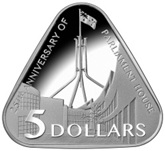
Image courtesy of the Royal Australian Mint
|
| 2013 |
Questions directed to non-government members
|
|
| |
In an unusual move during Question Time in the House of Representatives on 28 May 2013, the Hon. Anthony Albanese (ALP, Member for Grayndler, NSW, 1996‒) moved a Suspension of Standing and Sessional Orders to provide the Leader of the Opposition the Hon. Tony Abbott (LP, Member for Warringah, NSW, 1994‒), to address the House on man-made climate change.
Standing Order 99 provides for a question to be asked of another Member who is not a Minister or Parliamentary Secretary. The House of Representatives Practice notes that in practice questions are rarely directed to private Members and, where they have been, are often disallowed:
Questions not meeting the conditions of standing order 99, such as questions concerning party policies and statements made inside or outside the House, notably by the Members to whom such questions are directed, have been ruled out of order.[57]
In this case, the question was directed by Rob Oakeshott (IND, Member for Lyne, NSW, 2008‒) to both the Prime Minister and, with the indulgence of the House, to the Leader of the Opposition. His question did not meet the requirements of the Standing Order, hence the motion for Suspension of Standing and Sessional Orders to allow a response to be made. The Speaker, Anna Burke, ruled that the Opposition would not be able to answer the question but would have the opportunity to address the House after Question Time.[58] |
|
| 2013 |
ParlView launched on APH website
|
|
| |
On 24 June 2013 the Department of Parliamentary Services releases its innovative broadcast services, ParlView, for public viewing. ParlView enables users to watch, search and download parliamentary broadcasts, special parliamentary events and press conferences, and historical audio-visual material via the Parliament House website.
Initially it contains footage of parliamentary activity from 14 August 2012, all parliamentary press conferences, and a selection of significant historical events including the National Apology to the Stolen Generations, the National Apology for Forced Adoptions, and visits by the Queen and US President Obama. Over time, it will include more than 55,000 hours of archival parliamentary audio-visual records dating back to 1991.[59] |
|
| 2013 |
Bill to recognise local government in the Constitution |
|
| |
The Constitution Alteration (Local Government) 2013 passes both Houses on 24 June 2013 to amend section 96 of the Australian Constitution to make specific provision in relation to the granting of financial assistance by the Commonwealth to local government bodies. The legislation enables the proposal to amend the Constitution to be submitted to the electors in a referendum under section 128 of the Constitution.[60] The Prime Minister Julia Gillard had announced on 9 May 2013 that the federal Government intended to proceed with a referendum to be held on the same day as the federal election on 14 September 2013. However, due to the date of the general election being changed to 7 September 2013, the referendum does not proceed.[61] |
|
| 2013 |
Fiftieth anniversary of Yirrkala bark petitions |
|
| |
On 26 June 2013 the Prime Minister the Hon. Julia Gillard (ALP, Member for Lalor, Vic., 1998‒) and Leader of the Opposition the Hon. Tony Abbott (LP, Member for Warringah, NSW, 1994‒) acknowledge the 50th anniversary of the Yirrkala Bark Petitions being brought to Parliament House by the Yolngu people of Arnhem Land in the Northern Territory.
The Yolngu presented the petitions in 1963 in response to the Government’s removal of more than 300 square kilometres of their land in Arnhem Land, Northern Territory, to enable bauxite to be mined. A parliamentary committee of inquiry acknowledged the rights of Yolngu as set out in the petitions, and recommends to Parliament that compensation be paid for loss of livelihood, that sacred sites be protected, and that an ongoing parliamentary committee monitor the mining project. The petitioners turned to the Supreme Court in the Northern Territory but their case also failed to achieve their objective. Whilst they were not the first claims to be made by Indigenous groups, the Yirrkala bark petitions are the first traditional documents to be recognised by the Commonwealth Parliament and, as such, they represent documentary recognition of Indigenous people in Australian law. The Yirrkala Petitions were subsequently displayed to the public in the permanent Parliament House after the permanent Parliament House opened in 1988.[62] |
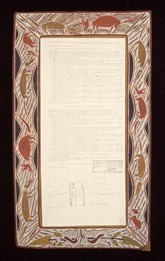
Yirrkala artists, Dhuwa moiety. Yirrkala Bark Petition 14.8.1963, 46.9 x 21 cm, natural ochres on bark, ink on paper
Image courtesy of Parliament House Art Collection, Canberra ACT
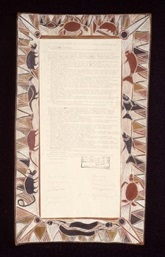
Yirrkala artists, Yirritja moiety, Yirrkala Bark Petition 28.8.1963, 46.9 x 21 cm, natural ochres on bark, ink on paper
Image courtesy of Parliament House Art Collection, Canberra ACT
|
2013 |
Former Prime Minister Kevin Rudd becomes Prime Minister |
|
| |
On 27 June 2013 the former Prime Minister the Hon. Kevin Rudd (ALP, Member for Griffith, Qld, 1998‒) is sworn in as Prime Minister by the Governor-General of Australia. He replaces the Hon. Julia Gillard (ALP, Member for Lalor, Vic., 1998‒), and is the first former Prime Minister to be returned to the position for a second term since the Hon. Robert Menzies (UAP, LP from 1944, Member for Kooyong, Vic, 1934‒66) in 1949. The Hon. Anthony Albanese (ALP, Member for Grayndler, NSW, 1996‒) is elected as Deputy Prime Minister. The leadership changes also results in a number of changes within the Ministry.
The Prime Minister the Hon. Julia Gillard (ALP, Member for Lalor, Vic., 1998‒) had called for a leadership ballot to be conducted by the Australian Labor Party caucus on 26 June. This follows continuing speculation about her leadership, and the circulation of a caucus petition seeking to allow a challenge to her prime ministership. Her predecessor, the Hon. Kevin Rudd MP, announced that he will challenge the Prime Minister. He succeeded in winning the leadership ballot by 57 votes to 45. The Hon. Kevin Rudd MP had previously served as Australia’s 26th Prime Minister from 4 December 2006 to 24 June 2010, resigning when challenged for the leadership of the ALP by the then Deputy Prime Minister, the Hon. Julia Gillard MP. He made an unsuccessful leadership challenge on 27 February 2012 and again on 21 March 2013 before his third and successful challenge on 26 June 2013. |
Watch: Outgoing Prime Minister the Hon. Julia Gillard MP’s concession speech, 27 June 2013
Watch: Incoming Prime Minister the Hon. Kevin Rudd MP’s press conference, 28 June 2013
Videos courtesy of DPS Broadcasting, Parliament House
|
| 2013 |
Changes to laws for migrant workers |
|
| |
The Migration Amendment (Temporary Sponsored Visas) Bill 2013 is passed by the Senate on 28 June 2013 and receives assent on 29 June 2013. The new law amends the Migration Act 1958 to strengthen the regulation of employer-sponsored skilled migrant workers who enter Australia under the 457 visa system. |
|
| 2013 |
End of National Tally Room in Canberra |
|
| |
Australia’s Electoral Commissioner, Ed Killesteyn, announces on 2 July 2013 that the Australian Electoral Commission (AEC) will not operate a National Tally Room during the 2013 federal election. The AEC now delivers online election results to the media and general public via its website, and the National Tally Room no longer plays a role in the actual delivery of election results. [63] |
|
| 2013 |
Visit by President of Timor-Leste
|
|
| |
On 8 July 2013 the President of the Democratic Republic of Timor-Leste, His Excellency Mr Taur Matan Ruak, attended a luncheon at Parliament House during his State Visit to Australia |
Watch: State Visit by President of Timor-Leste |
| 2013 |
Prorogation of 43rd Parliament |
|
| |
On 5 August 2013 the Official Secretary to the Governor-General reads the proclamation on behalf of the Governor-General of Australia that the 43rd Parliament is prorogued until 7 September 2013, the date set for the 2013 federal election.
The 43rd Parliament was the first hung Commonwealth Parliament since 1941. After the election, the Australian Labor Party negotiated agreement with three Independents and the Australian Greens giving it the necessary support to form a minority Government. The hung parliament, and the resulting Agreement for a better Parliament: Parliamentary Reform, had a major impact on the work and practices of the 43rd Parliament including the introduction of time limits on questions and answers, extra sitting hours, and greatly increased opportunities for private Members including a significant increase in the number of private members’ bills —more than in any year since Federation in 1901.[64]
|
Watch: Prorogation of 43rd Parliament
Videos courtesy of DPS Broadcasting, Parliament House
|
| 2013 |
Parliament House Open Day 2013
|
|
| |
Parliament House, celebrating its 25th anniversary, opened its doors to the public on 24 August 2013. Visitors were able to walk from the ceremonial main front doors, through the Great Hall, Members’ Hall, Cabinet Room and out into the Prime Minister’s courtyard. More than 8 000 people visited Parliament House and toured areas not normally open to the public. The Open Day featured a visit by the principal design architect, Romaldo Giurgola, as well as artists talking about their contributions to the making of the building. |
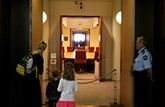
Parliament House 25th Anniversary Open Day 2013
Image courtesy of House of Representatives
|
| 2013 |
Governor-General offers resignation over Labor leadership ballot |
|
| |
On 13 October 2013 the Governor-General, Quentin Bryce AC, offers her resignation to Prime Minister Tony Abbott to avoid any perception of bias in anticipation of the election of her son-in-law, Bill Shorten (ALP, Member for Maribyrnong, Vic., 2007 ̶ ) as leader of the Australian Labor Party and Leader of the Opposition. Mr Abbott declines to accept the Governor-General’s resignation on the basis that ‘she will retire in March next year and … the Government commands the House of Representatives with a significant margin’.
The Governor-General is currently serving an extended term in office that she did not seek. Her agreement to stay on was a measure of her personal commitment to provide continuity at a time of political turbulence and she should be commended for her dedication to public service.[65]
|
|
2013 |
Opening of 44th Parliament
|
|
| |
The Governor-General, Quentin Bryce AC, opens the 44th Parliament on 12 November 2013, following the Commonwealth election held on 7 September 2013 at which the Coalition, led by the Hon. Tony Abbott (LP, Member for Warringah, NSW, 1994‒), wins government.
At the opening of the 44th Parliament, an Indigenous ceremony of welcome is held in the Great Hall and the Parliament is officially opened. Members of the House of Representatives, Territory Senators, and Senators filling casual vacancies are sworn in and, in the House of Representatives, the Hon Bronwyn Bishop MP (LP, Member for Mackellar, NSW, 1994 ̶ ) is elected as Speaker. In the afternoon Her Excellency the Governor-General gives an opening address. |
Watch: Official opening of the 44th Parliament
Read: The Governor-General’s speech
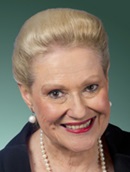
The new Speaker, the Hon. Bronwyn Bishop MP
|
| 2013 |
First Aboriginal woman elected to Commonwealth Parliament |
|
| |
At the opening of the 44th Parliament on 12 November 2013 Senator Nova Peris (ALP, Senator for the Northern Territory, 2013 ̶ ) is sworn in, becoming the first Aboriginal woman to be elected to the Senate and to the Commonwealth Parliament as a result of the Commonwealth election held on 7 September 2013.
Prior to the swearing-in ceremony, Senator Peris receives a traditional Indigenous blessing from Aboriginal land owners who travelled to Parliament House from the Northern Territory. Senator Peris was the first Aboriginal person to win an Olympic gold medal as a member of the Australian women’s hockey team at the 1996 Olympic Games. As the Senator for the Northern Territory, she takes up her seat at the commencement of the 44th Parliament, and gives an emotional first speech to the Parliament on 13 November 2013 still wearing white clay from the Indigenous blessing:
I was born in Darwin in the Northern Territory and I retain my strong cultural and spiritual ties to my country, to Mother Earth. I am a member of the oldest continuous living culture on the earth. I am proud that this hill that we meet on here today is culturally significant to the Ngambri people as representing the womb of the 'Woman' on this Country. It is very significant to me to be the first Aboriginal woman elected to the federal parliament of Australia.[66]
|
Watch: First speech by Senator Nova Peris
Read: First speech by Senator Nova Peris |
| 2013 |
Former Prime Minister Kevin Rudd resigns
|
|
| |
Former Prime Minister, the Hon. Kevin Rudd MP (ALP, Member for Griffith, Qld, 1998 ̶ ) announces his resignation from the Commonwealth Parliament on 13 November 2013. During his speech, he states:
To have served as Prime Minister of Australia has been a great honour afforded to very few in our country's history. For the future I wish the Prime Minister and his government well. I do that because I wish Australia well. The prime ministership of this Commonwealth is not easy. It is the hardest job in the land. The expectations of whoever holds the office are infinite, while the resources available are finite.[67]
He formally submits his resignation as Member for Griffith, Queensland on 22 November 2013, effective immediately. Mr Rudd is the fourth of Australia’s 28 Prime Ministers to have lost an election or the leadership of his party and resigned from parliament shortly afterwards, thereby bringing about a by-election.[68] |
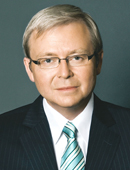
Kevin Rudd
Watch: Former Prime Minister Kevin Rudd’s resignation speech
Read: Former Prime Minister Kevin Rudd’s resignation speech |
2013 |
Retirement of the Clerk of the House of Representatives
|
|
| |
Mr Bernard Wright AO, Clerk of the House of Representatives since December 2009, retires on 31 December 2013. The new Clerk is Mr David Elder, who commences in the role on 1 January 2014. |
|